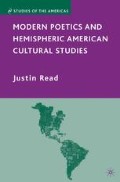Abstract
At the start of this book I axiomatically posited migration as the origin of America, and thus translation as the original language of the Americas. In preceding chapters, I have worked to demonstrate how modern poets concretized translation as a language in its own right. In doing so these poets framed not just multicultural encounter, but more powerfully framed the intercultural violence of migration as inherent to their sense of Americanism. This violence registers as rhetorical dislocation, typographical schism, and outright ethnic strife. Yet several questions still remain before I finish. The first question is a matter of subjectivity: How would intercultural violence, and the interlingual language of translation, be “internalized” as origins for American subject-formation? A second set of questions concern matters of political subjectivity: In what sense does intercultural violence demand a “politics of violence” in the Americas? How would American subjects born of violence factor into such politics? From where would a “politics of violence” derive authority over its subjects? In order to find out I would now like to confront one of the most difficult characters in American history, “Ezra Pound.”
Access this chapter
Tax calculation will be finalised at checkout
Purchases are for personal use only
Preview
Unable to display preview. Download preview PDF.
Notes
Consult Humphrey Carpenter’s A Serious Character: The Life of Ezra Pound (New York: Delta, 1988), 489–850
See Robert Casillo, The Genealogy of Demons (Evanston, IL: Northwestern University Press, 1988)
Reedway Dasenbrock, “Jefferson and/or Adams: A Shifting Mirror for Mussolini in the Middle Cantos,” ELH, 55.2 (Summer 1988): 505–526
Tim Redman, Ezra Pound and Italian Fascism (New York: Cambridge University Press, 1991).
These two cantos did not appear in the collected Cantos until 1985. One of the first and best accounts of their editorial trajectory may be found in Barbara C. Eastman’s article, “The Gap in The Cantos: 72 and 73” (Paideuma, 8.3 [Winter 1979]: 415–427).
Robert Casillo in his “Fascists of the Final Hour: Pound’s Italian Cantos,” Fascism, Aesthetics, and Culture, ed. Richard J. Golsan (Hanover, NH: University Press of New England, 1992).
Hugh Kenner, The Pound Era (Berkeley, CA: University of California Press, 1971), 410.
See Fernando Ortiz, Contrapunteo del tabaco y el azúcar (1940) (Barcelona: Editorial Ariel, 1963).
Edward W. Said, Orientalism (New York: Vintage Books, 1978), 67.
(Ezra Pound and James Laughlin, Selected Letters, ed. David M. Gordon [New York: W.W. Norton & Co., 1994], 114)
Ernest Fenollosa, “The Chinese Written Character as a Medium for Poetry” (1920), Instigations, ed. Ezra Pound (Freeport, NY: Books for Libraries Press, Inc., 1967), 358.
“Noigandres” is a word of unknown origin and meaning that appears in the poetry of Daniel Arnaut, and in Canto 20: “And he said: Noigandres! NOIgandres!” ‘You know for seex mon’s of my life’ ‘Effery night when I go to bett, I say to myself:’ Noigandres, eh, noigandres,’ ‘Now what the DEFFIL can that mean!’ “(C 89–90). The Brazilian concretists thus took Noigandres” as emblematic of poetic freedom. See Charles A. Perrone, Seven Faces: Brazilian Poetry since Modernism (Durham, NC: Duke University Press, 1996), 25–66
Haroldo de Campos, “Ideograma, Anagrama, Diagrama” (1977), Ideograma: Lègica, poesia, linguagem, org. Haroldo de Campos (São Paulo: EDUSP, 1994), 23–107.
Haroldo de Campos, “Anthropophagous Reason: Dialogue and Difference in Brazilian Culture,” trans. Odile Cisneros, Novas: Selected Writings, ed. Antonio Sérgio Bessa and Odile Cisneros (Evanston, IL: Northwestern University Press, 2007), 159–160.
See Ronald Bush’s “Excavating the Ideological Faultlines of Modernism” (Representing Modernist Texts, ed. George Bornstein [Ann Arbor, MI: University of Michigan Press, 1991], 67–98)
S. D. (Delmore Schwartz), “Notes on the Versification ofthe Cantos,” saddle-stitched pamphlet insert to Ezra Pound, Cantos LII-LXXI (New York: New Directions, 1940).
Copyright information
© 2009 Justin Read
About this chapter
Cite this chapter
Read, J. (2009). Alien Sedition: Anti-Semitism and Censorship in The Cantos of Ezra Pound. In: Modern Poetics and Hemispheric American Cultural Studies. Studies of the Americas. Palgrave Macmillan, New York. https://doi.org/10.1057/9780230623347_4
Download citation
DOI: https://doi.org/10.1057/9780230623347_4
Publisher Name: Palgrave Macmillan, New York
Print ISBN: 978-1-349-37957-6
Online ISBN: 978-0-230-62334-7
eBook Packages: Palgrave History CollectionHistory (R0)

